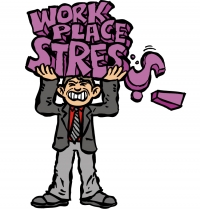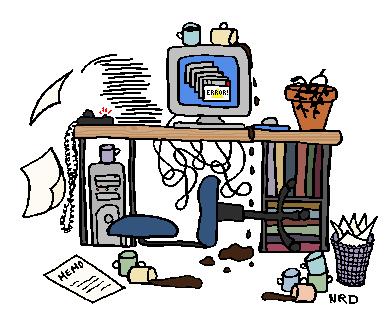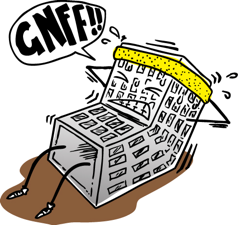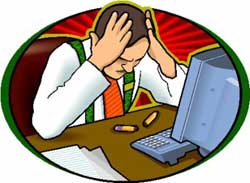What to do if you choose not to cut bait and run but, rather, hold fast and stick it out
A couple of new studies have identified the alternative of switching to low stress jobs for workers who are overcome with the stresses of their current positions, particularly in this current economy. You could, perhaps, secure one of these low stress positions if you really want to make the career move, but a catch twenty-two may exist, as the switching of jobs, itself, potentially brings on different stresses while dealing with the challenges of a new job learning curve and the demands of retraining. If you have a high stress job and are determined to stick it out, right where you are, and ride the waves, you can fortify yourself, and lower at least some of your job’s stress, by practicing smart stress reduction strategies, such as:
1. Sleep well and long enough. Know the amount of hours your body needs to cope with the challenges of your professional day. Do you need 6 hours? 7? 8? more? Figure this out by observing your natural wakeup time on your off days (when you’re not jolted into the next morning by a blaring alarm clock.) A fitful night’s sleep sets you up for increased workplace stress the next day, which makes for another fitful night’s sleep! Break that maddening (and stressful) cycle.
2. Eat well. Take what you intellectual already know about good eating habits and choose to actually practice them! Get up early enough to have a leisurely, relaxed breakfast that includes carbohydrates, fluids and protein. We all know that breakfast is the most important meal of the day, so why is it that so many otherwise smart professionals have only a cup of coffee for their first meal??? And best to have a solid breakfast, anyway, just in case you find you must skip lunch. With no breakfast and no lunch in your belly, how are you ever going to perform well on the job and make sound business decisions by 3 o’clock? Consider bringing your lunch from home, because it’s often a bought lunch that gets short changed if your day gets too stressful and too demanding to tear yourself away from your desk.
3. Breathe. It’s amazing how many of us never take a proper, full breath all day long, regardless of trade or profession. And those with sedentary, office/desk jobs are at the biggest disadvantage of all when it comes to proper breathing, for, as the day wears on, one’s posture naturally begins to slump (and lungs squish, especially if you haven’t peeled yourself out of your chair all day long!). Practice breathing awareness. Take a series of full, proper deep breaths once in awhile throughout your workday; and be sure to efficiently exhale, too. Studies show that inhaling is associated with drawing in stress, while exhaling releases. When on hold or waiting for another, take 10 deep breaths to help your muscles relax and reduce stress.
4. Practice Mindful Productivity: When you are very comfortable with the multiple daily tasks of your job, it’s easy to coast through the day on auto-pilot, without conscious awareness. Such a cruise-control approach can increase the number of errors in one’s performance, causing not only increased workload but, as well, increased stress and time-management issues.
5. Set Priorities and mange your time as best you can. Work with a Master/Best-Case/Ideal Daily “To Do” list, as well as a more realistic one that builds in, and even anticipates, interruptions and minor derailments. Work your plan, but be sure to build in enough flexibility so that you are not a prisoner of that plan and end up being stressed out by not achieving all that is on it.
6. Develop (or remind yourself of) gracious and communicative Assertive Communications Techniques, so that you can say, “No”, more often while still maintaining positive and communicative workplace relationships.
7. Develop (or remind yourself of) efficient and effective negotiation techniques. If you can’t possibly do all that’s expected of you in a day, week, month, etc., learn how to earnestly and positively express those concerns to your powers that be. Share what you believe is actually doable in a day, and what is not, and why, complete with suggestions for resolution (as no one really wants to hear out a whiner who is not willing to be part of the solution).
8. Develop (or remind yourself of) efficient and effective delegation skills. Do you really have to do everything all on your own? Sleuth out credible others within the workplace (or even beyond) whom you can engage to help you along with the tasks at hand.
9. Surrender to at least some interruptions. No day is ever full of only tasks. There are people to consider as well, and there will always be some interruptions, for sure. Rather than thinking of the interruptions as irritants, reframe your perspective by recognizing interruptions as a natural (and sometimes even productive) part of your business day. People will call and people will drop by, undoubtedly. While surrendering to this truth, however, still do your very best to surrender on your terms. For example, negotiate a telephone-free 90 minutes each day (at a time of day that best works for your rhythms and job demands). And/or negotiate a literal or metaphoric “closed door” policy for a window of time each day–a dedicated quiet time when all colleagues know that your are “hands off “and “ears off” for that span of time. And minimize the length of colleague “visitor” interruptions at other times of your business day–when you’re not on dedicated quiet time–by employing subtle strategies such as, e.g. placing books, papers, files, etc. on empty chairs at your work station/office and also by standing up to greet and chat momentarily with such visitors (a standing meeting and greeting always creates the illusion of movement and transit, while remaining seated telegraphs a relaxed and leisurely energy). The faster you can complete on a little polite socializing with colleagues, the faster you can get back to the pressing tasks at hand, and the faster you can complete on those projects which create escalating stress in your day.
10. In cases where you get to declare the deadline for delivery on promised tasks, employ the philosophy of, “under promise and over deliver”. Do your best to build in some subtle, yet realistic, slack time. When you are able to negotiate an “under promise” deadline, you give yourself breathing room to concentrate and focus on a quality delivery. You also set yourself up for greater professional credibility, as you are then perceived as a person who delivers either on-time or ahead of schedule–great for both your professional reputation and your sense of personal workplace satisfaction!
11. Embrace the old time-management philosophy, “Better to come into a plan, rather than come in to plan.” Meaning, cash-out each end-of-workday with a review of what was successfully completed and what still needs to be tackled first, second, third, etc. thing tomorrow. Know the vision of your next workday before you first step back into your office that following morning.
12. Master your email volume as best you can. 200+ incoming emails can freak out almost anyone. Do what you can to adjust your SPAM filters to your satisfaction. At your next team meeting negotiate agreement on the degree to which everyone cc’s and/or replies to “all”. Educate as many as possible to use crisp, efficient and informative subject lines. And consider the value of picking up the phone once in a while, instead of feeding another meal to the various electronic gluttons that eat away your day.
13. Hold meetings with formal agendas. Rambling meetings are often the bane of every employee’s existence and can significantly increase workplace stress, as time spent in meetings–however well intended or necessary–is time not spent purely on-the-job. If you must meet, make those gatherings efficient by creating an agenda (which can be built for several days prior to the meeting). Make agreements as to the time parameters for each agenda item and assign (a rotating, if you like) chair for each gathering.
14. Know the difference between what is important work to be done, what is urgent and what is merely, “I’ll get around to that some day”. However, recognize that even the “some day” work needs to be completed with some efficiency as, if it is not, it will fast become urgent and full of stress for you. For example, sooner or later be sure to file both your hard copy and electronic information. Nothing can drive you crazier, create more stress and consume more time than knowing you have that oh-so-important information “here somewhere”, but not being able to find it.
15. Employ the “Do it now” philosophy, where you can. When you actually do have a few moments to, “do it now or do it later”, do it now. Procrastination is a virus that can infect all you do, and that will eventually end up creating stressful emergencies of all your incomplete tasks.
16. Find some humor/some laughter in each day, whether through a book, a comic, interfacing with a funny colleague or sharing a joke. Humour and laughter breaks tension and brings colleagues together in a positive way. Whatever works for you and whatever it takes, make sure that even the most stressful and demanding of days includes at least one good workplace laugh. Collegial laughter is like a much-needed rest stop in the daily workplace marathon race. Like my piano teacher always reminded, “Rests are part of the music”.
17. Get to the gym, or exercise elsewhere and somehow, if you are so inclined. Or, at the very least, find ways in your daily workplace travels to move your body (especially if you are tethered to a desk all day long). Take the stairs and, if you are really daring, take them (up) two at a time to emulate walking lunges you’d otherwise have done at the gym!
18. Change your voice mail daily so that your incoming callers know exactly where you are and when you’ll return. Knowing this, some callers will choose not to leave (yet another!) voice mail for you at all but, rather, call you back when you’re there once again. Less voice mail means less stress. And do the same for your email, too, by creating your out-of-office message every time you’re away, even for a day.
19. Take a midday catnap (on your own time!). Even Albert Einstein knew the value of brief daytime naps to refresh one’s mind, energy, creativity and productivity. If you can’t actually find the time or place for a power snooze, develop your meditative techniques (to capture much of the same benefit of an unconscious, closed-eye, relaxed and quiet state).
20. Embrace routine and daily rituals. Much research shows that children are more relaxed and comforted/less stressed if surrounded by routine. The same is true for adults. Routine, although sometimes perceived as boring and predictable, can offer a stressed-out employee a much-needed anchor, sense of safety and peace. Personal rituals for starting and ending one’s business day are terrific bookends for daily routine, too.
21. Say, “yes” to less. If you are one of those people that says yes to all that is asked of you, at least through the roughest days of your stressful workplace, learn to hold your tongue and let another say yes for a change.
22. Nurture at least one authentic workplace friendship, so that you always have at least one “safe” person with whom to commiserate about the job, the corporate culture, the workplace stress, etc. But make sure that commiserating does not become a habit. Remember, “misery loves company”. Commiserating should be a stress-busting strategy employed with time limitations, e.g. only 5 minutes a day, then let it go.
23. Observe your stress triggers and take action. Note what happens to you on a physiological level when you feel your stress levels rising. Does your jaw clench? voice rise? palms sweat? heart race? head pound? teeth grit? Identifying your stress triggers–when they are merely percolating, rather than exploding–can act as early warning system for shifting perspectives, removing yourself from the stressful situation, etc.
24. Take advantage of employer sponsored Employee Assistance Programs (EAP) if your stress levels get beyond your own ability to handle using simple stress reduction techniques. Be willing to accept that sooner or later most every professional–regardless of field, industry or position–could benefit from professional counsel.
25. Be determined to embrace a positive attitude, come what may…even if you have to, “fake it ’til you make it” some of the time. Whatever it takes, find the good, the lesson, the value in this stressful period of your professional life and embrace the philosophy that, “This too shall pass”. And be comforted that, “Out of order comes chaos, and out of chaos, order will surely come again”.
Bonus:
26. Be on your own side; be your own best friend; be good, kind and gentle to yourself.
Take charge of your own energy and then help orchestrate the energy of those around you.
— Peter Drucker —
















